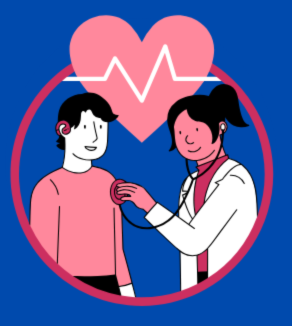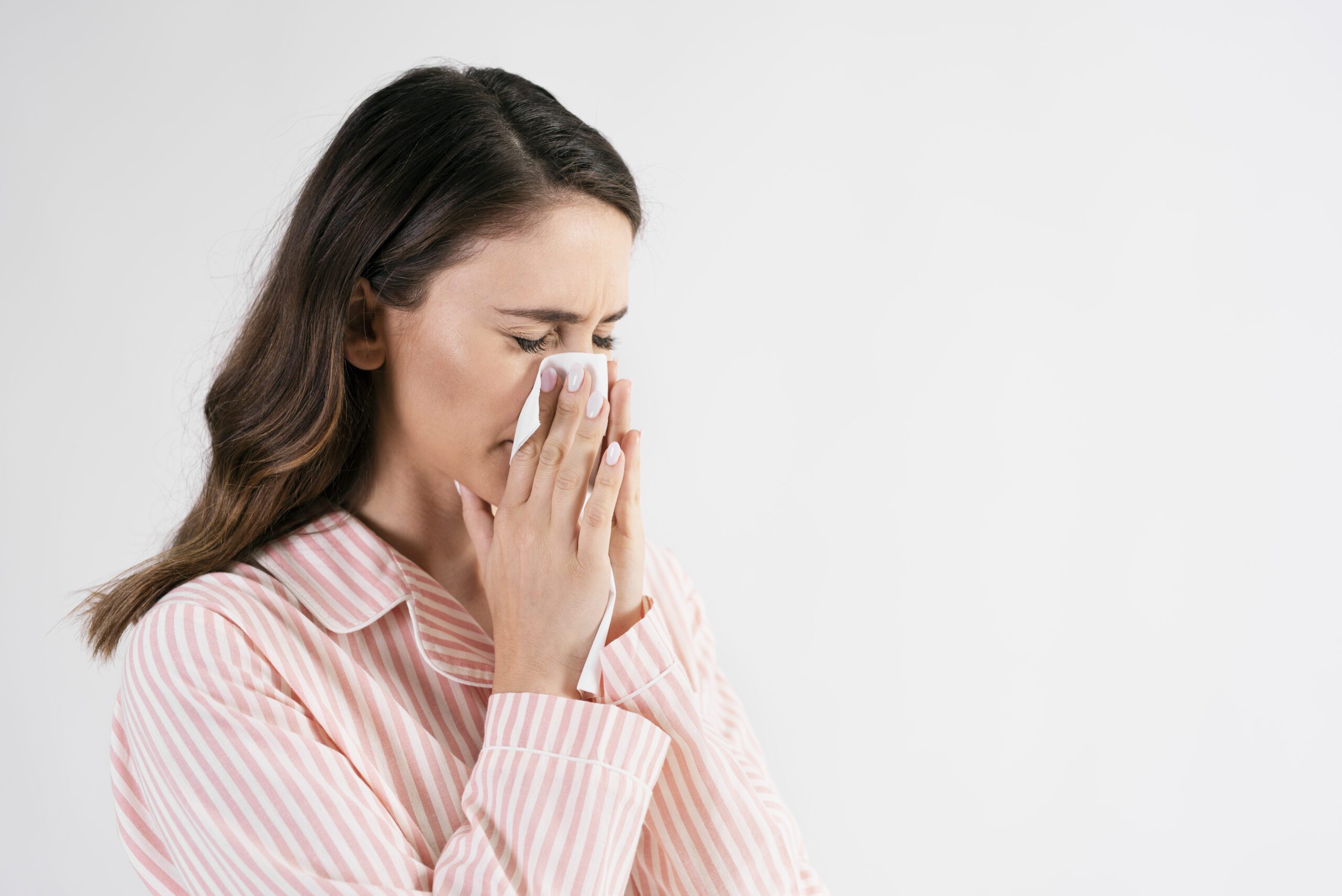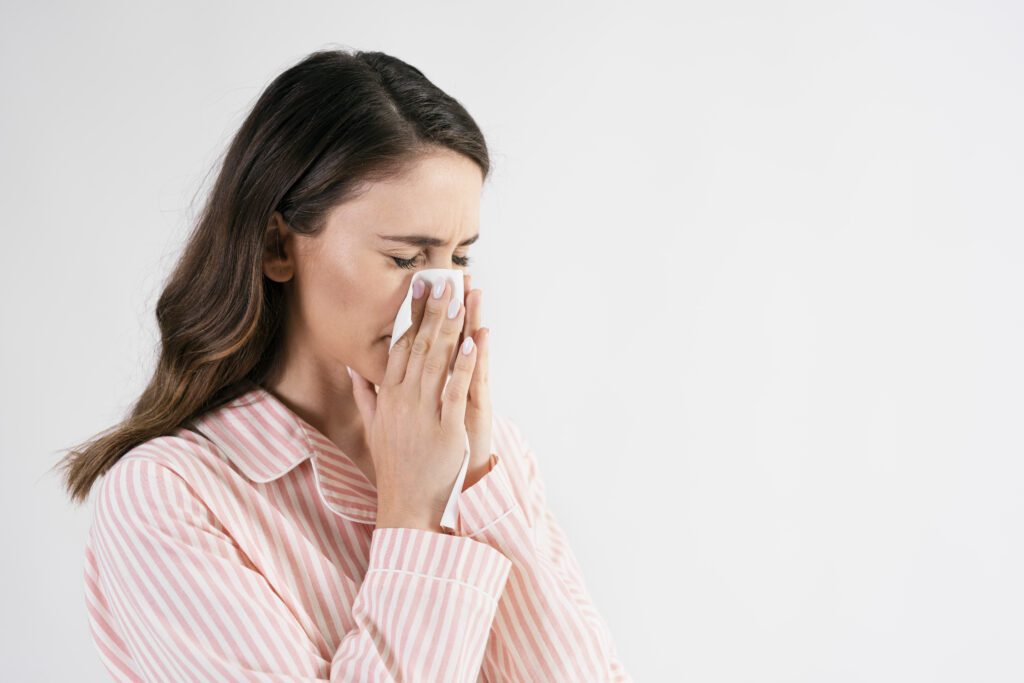When the mucous membrane within the nose becomes irritated and inflamed, it is called rhinitis or coryza. The most common type of rhinitis, allergic rhinitis, is an inflammation of the nasal membranes that can cause sneezing, rhinorrhea, nasal congestion, and itching in any combination.
Even while allergic rhinitis is not fatal, the illness can have serious side effects. Inhaling an allergen might result in allergic rhinitis. Additionally, it may have a seasonal effect on you at particular periods of the year or a effect on you all year long.
SYMPTOMS :
- Sneezing
- Itching (eyes, nose, ear )
- Drowsiness
- Headache
- Sore throat
- Postnasal drip
- Red eyes
- Congestion
* This is not a complete list of side effects and others may occur. Call your doctor for medical advice about side effects.
TYPES OF RHINITUS :
There are distinct rhinitus subgroups that are widely accepted:
- Allergic Rhinitus (AR),
- Non-allergic Rhinitus (NAR)
Allergic Rhinitus
Symptoms of allergic rhinitus include anterior or posterior rhinorrhea, nasal congestion or blockage, nose itching, and sneezing that lasts for more than an hour on two or more days in a row.
Allergens linked to allergic rhinitis are airborne particles such as dust mites, pollens, animal dander, insect excrement, and molds.
Conjunctivitis and asthma are frequent co-occurring conditions linked to allergic rhinitis. Given that upper and lower airway inflammation share common pathophysiologic mechanisms and coexist and communicate via the systemic circulation, the hypothesis of the united airway may help to explain its high link with asthma.
Non allergic Rhinitus :
Chronic rhinitus that lacks systemic allergic inflammation and endonasal infection symptoms (negative SPT, negative total blood IgE, and negative RAST tests) is known as non-allergic rhinitis. A diverse collection of patients with non-allergic rhinitis can be divided into at least six subgroups.
- Drug-induced rhinitus
- Hormone-induced rhinitus
- Senile rhinitus or rhinitus of the elderly
- Gustatory rhinitus
- Occupational rhinitus
- Idiopathic rhinitus
- Atrophic rhinitus
The three main treatment options for allergic rhinitus are as follows:
- Controlling the environment and avoiding allergens: Among these are minimizing exposure to allergens like mold, dust mites, and pollen.
- Pharmacologic management: Oral antihistamines, decongestants, or both are frequently used to treat patients with success; however, patients with chronic symptoms may benefit more from routine use of an intranasal steroid spray.
Important suggestions consist of the subsequent:
- Individuals who have red, watery eyes, congested noses, or discoloured nasal passages. Because sinus imaging exposes patients to needless radiation, doctors should instead use targeted immunoglobin E screening instead of sinus imaging.
- It is advised to start treatment with intranasal steroids and oral antihistamines. Nor are oral leukotriene receptor antagonists.
- In patients who do not respond to pharmaceutical therapy, sublingual or subcutaneous immunotherapy should be considered.
How Is Rhinitis Diagnosed?
Your physician does a thorough history and physical examination to diagnose allergic rhinitis. For blood or skin testing for allergies, they might also recommend that you see an allergist. In order to diagnose allergic or nonallergic rhinitis, your doctor might use this information.
How can rhinitis be managed?
Avoiding your allergen is the best strategy to treat allergic rhinitus. If you have an allergy to microbes, pet dander, or other common allergens, get rid of such items from the place where you live.
Reduce the amount of time you spend outside during the flowering season of plants if you have a pollen allergy. It’s advisable to take precautions against pollen entering your house and vehicle.
Consider shutting your windows and adding a HEPA filter to your air conditioning unit. If avoiding your allergen is not an option, taking medication can help reduce symptoms. Your doctor may prescribe decongestants, nasal saline sprays, nasal corticosteroid sprays, or nasal antihistamine sprays as over-the-counter or prescription treatments for nonallergic rhinitus.
For more details about your particular diagnosis, available treatments, and outcome in future, consult with your physician.
TREATMENT :
The majority of allergic rhinitus cases respond to medication. When treating patients with sporadic symptoms, oral antihistamines, decongestants, or both as necessary, are frequently sufficient.
Always consult your healthcare provider to ensure the information displayed on this page applies to your personal circumstances.
FAQ :
Is allergic rhinitis serious?
In certain instances, problems may arise from allergic rhinitis. Neural polyps are aberrant but benign (non-cancerous) fluid sacs that form inside the sinuses and nasal passages. Sinusitis is an infection brought on by swelling and inflammation of the nose that stops mucus from flowing from the sinuses.
Can allergic rhinitis be cured?
Although there is no known treatment for allergic rhinitis, antihistamine drugs and nasal sprays can help minimize its symptoms. Immunotherapy is a therapeutic alternative that a doctor might suggest for long-term relief. Allergen avoidance is another option.
What is the fastest way to treat allergic rhinitis?
- Antihistamines
-
Decongestants
-
Eye drops and nasal sprayS
- Immunotherapy
- Sublingual immunotherapy (SLIT)



1 thought on “RHINITIS”
Comments are closed.